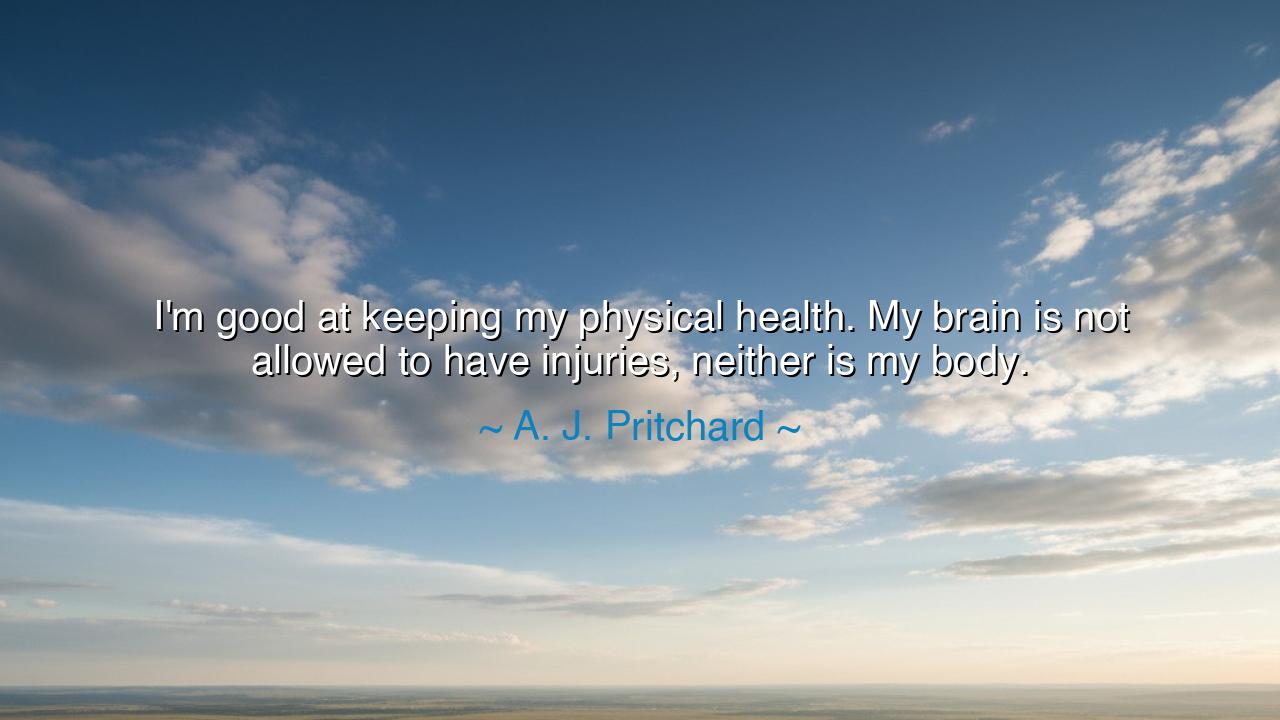
I'm good at keeping my physical health. My brain is not allowed
I'm good at keeping my physical health. My brain is not allowed to have injuries, neither is my body.






In the words of A. J. Pritchard, the dancer and performer whose art demands harmony between mind and body, we find a declaration both powerful and profound: “I’m good at keeping my physical health. My brain is not allowed to have injuries, neither is my body.” Though simple at first glance, these words carry within them a truth that echoes through the ages — that the mind and body are not two separate realms, but one sacred vessel. To care for one without the other is to build strength upon sand. In his words, Pritchard does not merely speak as an artist guarding his craft, but as a philosopher of discipline and self-mastery, one who understands that excellence begins in the union of thought and flesh.
A. J. Pritchard, known to many for his mastery of dance, lives in a world where precision, endurance, and grace are inseparable. The dancer’s instrument is his own being — every muscle, every heartbeat, every flicker of focus. To say that his brain is not allowed to have injuries is to proclaim the sacredness of mental strength, the discipline of will that guides every step. To say that his body must not be harmed is to honor the temple of form through which art is born. Thus, his quote reveals the creed of those who walk the path of mastery: to preserve both mind and body in balance, for one cannot thrive without the other. The wound of the body weakens the spirit; the wound of the mind breaks the body.
In this, Pritchard’s wisdom mirrors that of the ancients. The philosophers of Greece taught that health was not merely the absence of illness, but the harmony of the whole being. Hippocrates, father of medicine, wrote that “the soul and body are one, and cannot be healed apart.” The warrior-philosophers of Rome, too, lived by this truth: Mens sana in corpore sano — a sound mind in a sound body. In their eyes, the highest virtue was not in excess, but in balance. The man who trained his body but neglected his mind was no better than a beast; the man who sharpened his intellect but let his flesh decay was as fragile as glass. Only through harmony could one achieve strength that endured both storm and time.
To understand the depth of this truth, consider the story of Bruce Lee, the martial artist and philosopher whose life became a testament to the union of body and mind. Lee did not see fighting as violence, but as a dialogue between physical power and mental clarity. His training was not only in strikes and forms but in thought, in philosophy, in awareness. He once said, “As you think, so shall you become.” When injury struck, he used the stillness of recovery to strengthen his mind; when the body was whole, he used his mental discipline to push beyond limits. Like Pritchard, he believed that the brain and the body must be equally trained — that neither should be allowed to falter, for both serve the greater purpose of human potential.
But the lesson of Pritchard’s quote goes beyond artistry or performance; it speaks to every soul that walks the path of life. In an age where the body is often worshiped and the mind neglected — or where the mind is consumed by worry and the body forgotten — he reminds us to restore the sacred balance. The health of one sustains the other. The athlete who ignores his mental peace finds his strength fading; the thinker who forsakes his body discovers his ideas dimming. To live fully, one must guard both realms — feed the mind with wisdom, and the body with care.
And yet, to say “my brain is not allowed to have injuries” is not denial, but devotion. It is a vow of mastery — a declaration that the mind must not be surrendered to fear, laziness, or despair. Injuries of the body may come from accident, but injuries of the mind often come from neglect. To keep the brain uninjured is to protect it from corrosion — from anger, envy, and self-doubt. To keep the body uninjured is to honor it with movement, nourishment, and rest. Thus, Pritchard’s quote is not arrogance, but reverence — a statement of gratitude for the miracle of being alive and the responsibility that comes with it.
So let this wisdom be passed on as a living flame: guard your health as a warrior guards his sword. Treat your body as a temple, and your mind as the divine fire that dwells within. Exercise daily not only in strength, but in stillness. Feed yourself not only with food, but with truth. When you rise in the morning, thank your body for its endurance and your mind for its vision. And when hardship comes, do not let injury — of limb or of spirit — define you. Heal, rise, and continue the dance of life.
For in the words of A. J. Pritchard, we are reminded that the body and mind are not possessions, but sacred trusts. To preserve them is to honor the life we have been given. The wise do not wait for illness to awaken gratitude — they live each day in balance, in awareness, in reverence. Thus, may we, too, learn to say with strength and serenity: my body shall not falter, my mind shall not break — for both are one, and both are my path to freedom.






AAdministratorAdministrator
Welcome, honored guests. Please leave a comment, we will respond soon